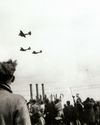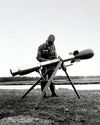
During the Second World War, particularly the early years, there were several threats to Britain’s vital mercantile traffic: enemy aircraft, ships and submarines. And in the coastal waters surrounding the country lurked another danger – mines.
During the First World War, Germany had deployed 25,000 mines in British waters, sinking 259 merchant vessels. To counter this threat the Royal Navy (RN) eventually amassed a force of 726 minesweepers in home waters. Yet on 3 September 1939, despite the last-minute requisitioning of trawlers for conversion to minesweeping duties and the re-emergence of First World War-era minesweepers from Reserve, the RN’s active minesweeping force comprised just 29 Fleet minesweepers and 25 minesweeping trawlers.
The first losses to mines in British coastal waters occurred on 10 September when the SS Magdepur and SS Goodwood were sunk in the vital East Coast War Channel. Other losses soon followed, but all these early sinkings were in waters that had been swept and re-swept. As losses and concerns soared, it was clear something was going wrong. The answer lay in Germany’s advanced development of the magnetic mine during the inter-war years.
The magnetic mine was not a German invention; it had first been developed – and deployed – by Britain in 1918. However Germany had taken the technology forward in the 1930s whereas RN interest had lapsed, so while RN sweepers were well-practised in sweeping for ‘conventional’ moored, contact mines with which they were already familiar, they had no effective means of countering magnetic mines, which were taking a heavy toll on shipping around the coast.
This story is from the {{IssueName}} edition of {{MagazineName}}.
Start your 7-day Magzter GOLD free trial to access thousands of curated premium stories, and 9,000+ magazines and newspapers.
Already a subscriber ? Sign In
This story is from the {{IssueName}} edition of {{MagazineName}}.
Start your 7-day Magzter GOLD free trial to access thousands of curated premium stories, and 9,000+ magazines and newspapers.
Already a subscriber? Sign In

NAUMACHIA TRUTH BEHIND ROME'S GLADIATOR SEA BATTLES
In their quest for evermore novel and bloody entertainment, the Romans staged enormous naval fights on artificial lakes

OPERATION MANNA
In late April 1945, millions of Dutch civilians were starving as Nazi retribution for the failed Operation Market Garden cut off supplies. eet as In response, Allied bombers launched a risky mission to air-drop food

GASSING HITLER
Just a month before the end of WWI, the future Fuhrer was blinded by a British shell and invalided away from the frontline. Over a century later, has the artillery brigade that launched the fateful attack finally been identified?

SALAMANCA
After years of largely defensive campaigning, Lieutenant General Arthur Wellesley went on the offensive against a French invasion of Andalusia

HUMBERT 'ROCKY'VERSACE
Early in the Vietnam War, a dedicated US Special Forces officer defied his merciless Viet Cong captors and inspired his fellow POWs to survive

LEYTE 1944 SINKING THE RISING SUN
One of the more difficult island campaigns in WWII's Pacific Theatre saw a brutal months-long fight that exhausted Japan’s military strength

MAD DAWN
How technology transformed strategic thinking and military doctrine from the Cold War to the current day

BRUSHES WITH ARMAGEDDON
Humanity came close to self-annihilation with the Cuban Missile Crisis, Broken Arrows’ and other nuclear near misses

THE DEADLY RACE
How the road to peace led to an arms contest between the USA and USSR, with prototypes, proliferation and the world’s biggest bomb

THE MANHATTAN PROJECT
Einstein, Oppenheimer and the race to beat Hitler to the bomb. How a science project in the desert helped win a war